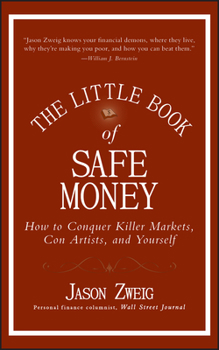The Little Book of Safe Money: How to Conquer Killer Markets, Con Artists, and Yourself
Select Format
Select Condition 
Book Overview
The Little Book of Safe Money acts as a guide for those trying to make their way through today's down markets. The topics covered include everything from investing behavior-why our minds come with their own set of biases that often prove harmful-to the use of financial advisors. But this timely book goes one step further than the rest by questioning an investor's true appetite for risk.
The Little Book of Safe Money also contradicts many of the myths that whirl around Wall Street with chapters like "Why Ultra-ETFs Are Mega-Dangerous" and "Hedge-Fund Hooey." Writing in the classic Little Book style, author Jason Zweig peels away layer after layer of buzz words, emotion, and myths to reveal what's really going on in today's financial markets.
Outlines strategies for satisfying our ever-changing investment appetites while focusing on a long-term financial plan Author Jason Zweig is a trusted voice in the financial community and his straightforward style resonates with investors Offers practical guidance, tools, and tips for surviving and thriving in a down marketIf you're serious about succeeding in today's turbulent markets, then The Little Book of Safe Money is what you should be reading.






